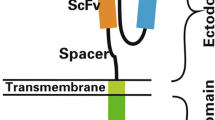Abstract
Chimeric antigen receptor (CAR) T cell therapy that involves genetic engineering a patient’s own immune cells with antigen-specific receptors has shown remarkable efficacy in blood cancer treatment. Numerous clinical studies with CAR T cells targeting the blood cell surface protein CD19 led to the FDA ’s first approval of a genetically engineered cell therapy. The process of generating potent CAR T cells involves several carefully performed manufacturing steps. Here, we describe the generation of redirected engineered human CAR T cells for preclinical studies starting with the CAR design, retroviral gene transfer, detection of CAR expression, and expansion of transduced T cells.
Access this chapter
Tax calculation will be finalised at checkout
Purchases are for personal use only
Similar content being viewed by others
Abbreviations
- CAR:
-
Chimeric antigen receptor
- FACS:
-
Fluorescence-activated cell sorting
- FBS:
-
Fetal bovine serum
- GaLV :
-
Gibbon ape leukemia virus
- ICS:
-
Intracellular signaling
- IL:
-
Interleukin
- mAb:
-
Monoclonal antibody
- ORF :
-
Open reading frame
- RN :
-
RetroNectin
- RT :
-
Room temperature
- scFv :
-
Single chain variable fragment
- SN:
-
Supernatant
- SP :
-
Signal peptide
- TM:
-
Transmembrane domain
- VH:
-
IgG heavy chain variable region
- VL :
-
IgG light chain variable region
References
Gross G, Waks T, Eshhar Z (1989) Expression of immunoglobulin-T-cell receptor chimeric molecules as functional receptors with antibody-type specificity. Proc Natl Acad Sci U S A 86(24):10024–10028. https://doi.org/10.1073/pnas.86.24.10024
Krause A, Guo HF, Latouche JB, Tan C, Cheung NK, Sadelain M (1998) Antigen-dependent CD28 signaling selectively enhances survival and proliferation in genetically modified activated human primary T lymphocytes. J Exp Med 188(4):619–626. https://doi.org/10.1084/jem.188.4.619
Gong MC, Latouche JB, Krause A, Heston WD, Bander NH, Sadelain M (1999) Cancer patient T cells genetically targeted to prostate-specific membrane antigen specifically lyse prostate cancer cells and release cytokines in response to prostate-specific membrane antigen. Neoplasia 1(2):123–127. https://doi.org/10.1038/sj.neo.7900018
Hollyman D, Stefanski J, Przybylowski M, Bartido S, Borquez-Ojeda O, Taylor C, Yeh R, Capacio V, Olszewska M, Hosey J, Sadelain M, Brentjens RJ, Riviere I (2009) Manufacturing validation of biologically functional T cells targeted to CD19 antigen for autologous adoptive cell therapy. J Immunother 32(2):169–180. https://doi.org/10.1097/CJI.0b013e318194a6e8
Brentjens RJ, Davila ML, Riviere I, Park J, Wang X, Cowell LG, Bartido S, Stefanski J, Taylor C, Olszewska M, Borquez-Ojeda O, Qu J, Wasielewska T, He Q, Bernal Y, Rijo IV, Hedvat C, Kobos R, Curran K, Steinherz P, Jurcic J, Rosenblat T, Maslak P, Frattini M, Sadelain M (2013) CD19-targeted T cells rapidly induce molecular remissions in adults with chemotherapy-refractory acute lymphoblastic leukemia. Sci Transl Med 5(177):177ra138. https://doi.org/10.1126/scitranslmed.3005930
June CH, O’Connor RS, Kawalekar OU, Ghassemi S, Milone MC (2018) CAR T cell immunotherapy for human cancer. Science 359(6382):1361–1365. https://doi.org/10.1126/science.aar6711
Brudno JN, Kochenderfer JN (2018) Chimeric antigen receptor T-cell therapies for lymphoma. Nat Rev Clin Oncol 15(1):31–46. https://doi.org/10.1038/nrclinonc.2017.128
Sadelain M (2017) CD19 CAR T cells. Cell 171(7):1471. https://doi.org/10.1016/j.cell.2017.12.002
Boyiadzis MM, Dhodapkar MV, Brentjens RJ, Kochenderfer JN, Neelapu SS, Maus MV, Porter DL, Maloney DG, Grupp SA, Mackall CL, June CH, Bishop MR (2018) Chimeric antigen receptor (CAR) T therapies for the treatment of hematologic malignancies: clinical perspective and significance. J Immunother Cancer 6(1):137. https://doi.org/10.1186/s40425-018-0460-5
Hopken UE, Rehm A (2019) Targeting the tumor microenvironment of leukemia and lymphoma. Trends Cancer 5(6):351–364. https://doi.org/10.1016/j.trecan.2019.05.001
Bluhm J, Kieback E, Marino SF, Oden F, Westermann J, Chmielewski M, Abken H, Uckert W, Hopken UE, Rehm A (2018) CAR T cells with enhanced sensitivity to B cell maturation antigen for the targeting of B cell non-Hodgkin’s lymphoma and multiple myeloma. Mol Ther 26(8):1906–1920. https://doi.org/10.1016/j.ymthe.2018.06.012
Bunse M, Pfeilschifter J, Bluhm J, Zschummel M, Joedicke JJ, Wirges A, Stark H, Kretschmer V, Chmielewski M, Uckert W, Abken H, Westermann J, Rehm A, Hopken UE (2021) CXCR5 CAR-T cells simultaneously target B cell non-Hodgkin’s lymphoma and tumor-supportive follicular T helper cells. Nat Commun 12(1):240. https://doi.org/10.1038/s41467-020-20488-3
Ghani K, Wang X, de Campos-Lima PO, Olszewska M, Kamen A, Riviere I, Caruso M (2009) Efficient human hematopoietic cell transduction using RD114- and GALV-pseudotyped retroviral vectors produced in suspension and serum-free media. Hum Gene Ther 20(9):966–974. https://doi.org/10.1089/hum.2009.001
Engels B, Cam H, Schuler T, Indraccolo S, Gladow M, Baum C, Blankenstein T, Uckert W (2003) Retroviral vectors for high-level transgene expression in T lymphocytes. Hum Gene Ther 14(12):1155–1168. https://doi.org/10.1089/104303403322167993
Hombach A, Hombach AA, Abken H (2010) Adoptive immunotherapy with genetically engineered T cells: modification of the IgG1 Fc ‘spacer’ domain in the extracellular moiety of chimeric antigen receptors avoids ‘off-target’ activation and unintended initiation of an innate immune response. Gene Ther 17(10):1206–1213. https://doi.org/10.1038/gt.2010.91
Faitschuk E, Hombach AA, Frenzel LP, Wendtner CM, Abken H (2016) Chimeric antigen receptor T cells targeting Fc mu receptor selectively eliminate CLL cells while sparing healthy B cells. Blood 128(13):1711–1722. https://doi.org/10.1182/blood-2016-01-692046
Author information
Authors and Affiliations
Corresponding author
Editor information
Editors and Affiliations
Rights and permissions
Copyright information
© 2022 The Author(s), under exclusive license to Springer Science+Business Media, LLC, part of Springer Nature
About this protocol
Cite this protocol
Bunse, M., Höpken, U.E. (2022). Generation of Redirected Engineered Human Chimeric Antigen Receptor (CAR) T Cells. In: Walther, W. (eds) Gene Therapy of Cancer. Methods in Molecular Biology, vol 2521. Humana, New York, NY. https://doi.org/10.1007/978-1-0716-2441-8_4
Download citation
DOI: https://doi.org/10.1007/978-1-0716-2441-8_4
Published:
Publisher Name: Humana, New York, NY
Print ISBN: 978-1-0716-2440-1
Online ISBN: 978-1-0716-2441-8
eBook Packages: Springer Protocols




